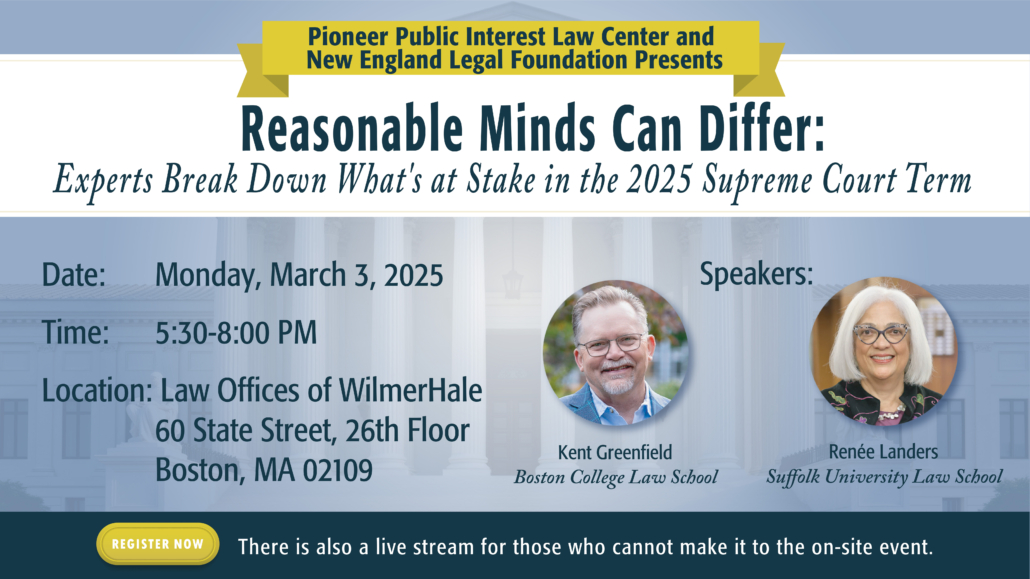MORE ARTICLES
 Director/Actor Samuel Lee Fudge on Marcus Garvey & Pan-AfricanismFebruary 26, 2025 - 1:31 pm
Director/Actor Samuel Lee Fudge on Marcus Garvey & Pan-AfricanismFebruary 26, 2025 - 1:31 pm State Report Card on Telehealth Reform: Progress Slowed in 2024 Leaving Patients Without AccessFebruary 26, 2025 - 12:02 pm
State Report Card on Telehealth Reform: Progress Slowed in 2024 Leaving Patients Without AccessFebruary 26, 2025 - 12:02 pm Wildflower’s 70+ Microschools, Eight Years Later: Did Matt’s Vision Become Reality?February 20, 2025 - 2:31 pm
Wildflower’s 70+ Microschools, Eight Years Later: Did Matt’s Vision Become Reality?February 20, 2025 - 2:31 pm Pioneer Institute Study Says MA Housing Permitting Process Needs Systemic ReformFebruary 19, 2025 - 7:09 pm
Pioneer Institute Study Says MA Housing Permitting Process Needs Systemic ReformFebruary 19, 2025 - 7:09 pm Cornell’s Margaret Washington on Sojourner Truth, Abolitionism, & Women’s RightsFebruary 19, 2025 - 1:08 pm
Cornell’s Margaret Washington on Sojourner Truth, Abolitionism, & Women’s RightsFebruary 19, 2025 - 1:08 pm UK Oxford & ASU’s Sir Jonathan Bate on Shakespeare’s Romeo and Juliet & LoveFebruary 14, 2025 - 11:41 am
UK Oxford & ASU’s Sir Jonathan Bate on Shakespeare’s Romeo and Juliet & LoveFebruary 14, 2025 - 11:41 am Mapping Mass Migration – New 2024 Census Estimates Show Surge in Population Growth, With Considerable CaveatsFebruary 13, 2025 - 1:13 pm
Mapping Mass Migration – New 2024 Census Estimates Show Surge in Population Growth, With Considerable CaveatsFebruary 13, 2025 - 1:13 pm Curious Mike’s Visit to Rain Lily MicroschoolFebruary 13, 2025 - 10:46 am
Curious Mike’s Visit to Rain Lily MicroschoolFebruary 13, 2025 - 10:46 am Steven Wilson on The Lost Decade: Returning to the Fight for Better Schools in AmericaFebruary 12, 2025 - 9:47 am
Steven Wilson on The Lost Decade: Returning to the Fight for Better Schools in AmericaFebruary 12, 2025 - 9:47 am Study Finds Bump in State Population Due to Changes in Census Bureau MethodologyFebruary 11, 2025 - 7:00 am
Study Finds Bump in State Population Due to Changes in Census Bureau MethodologyFebruary 11, 2025 - 7:00 am
Stay Connected!
Receive the latest updates in your inbox.


Happy Holidays
/in Blog, Featured /by Editorial StaffDuring this festive season, we want to wish you and your loved ones a joyous holiday and happy New Year.
Pioneer Commends MA Governor-elect Healey’s Step Toward Greater Transparency
/in Better Government, Featured, Press Releases: Government, Transparency /by Editorial StaffPioneer Institute commends Governor-elect Maura Healey for choosing not to claim a public records exemption for the governor’s office. Governor-elect Healey also pledged to support legislation that would curb exemptions claimed by the legislative and judiciary branches of state government.
UK’s Prof. Michael Slater on Charles Dickens, Ebenezer Scrooge, and A Christmas Carol
/in Academic Standards, Featured, Podcast /by Editorial StaffThis week on “The Learning Curve,” co-host Gerard Robinson and guest co-host Mary Connaughton talk with Prof. Michael Slater, Emeritus Professor of Victorian Literature at Birkbeck College, University of London, and the world’s foremost expert on Charles Dickens and his works. They discuss some of the main elements of Dickens’ brilliant, prolific, and complicated life, as the 19th century’s most influential, best-selling writer of memorable works, from Oliver Twist to Great Expectations.
Eight Billion Minds: Unsustainable Population Bomb or Infinite Resource?
/in Economic Opportunity, Featured, Podcast Hubwonk /by Editorial StaffHubwonk host Joe Selvaggi talks with Cato Scholar and author Marian Tupy about his new book, Superabundance: The Story of Population Growth, Innovation, and Human Flourishing on an Infinitely Bountiful Planet, focusing on the contrast in policy perspectives between those who see humans consumers of finite resources and those who recognize the unlimited potential of human ingenuity.
Study Urges Massachusetts to Embrace Innovative School Models
/in Featured, Press Releases, Press Releases: Choice Programs, Press Releases: Education, Press Releases: Homeschooling, Press Releases: Online Learning, Press Releases: School Choice, School Choice, Virtual Schools /by Editorial StaffA new policy brief from Pioneer Institute urges Massachusetts policymakers to encourage the proliferation and progress of non-traditional models that offer families creative, flexible, personalized and low-cost private education options.